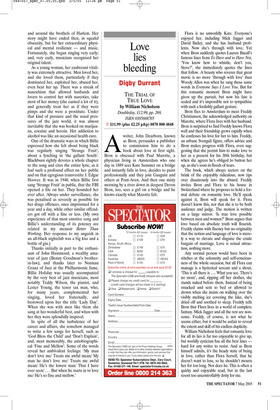Love lies bleeding
Digby Durrant
THE TRIAL OF TRUE LOVE by William Nicholson Doubleday, £12.99, pp. 269, ISBN 0385608705 V £11.99 (plus £2.25 p&p) 0870 800 4848 Awriter, John Dearborn, known as Bron, persuades a publisher to commission him to do a book about love at first sight. Bron is obsessed with Paul Marotte, a physician living in Amsterdam who one day in 1889 sees Kate Summer on a bridge and instantly falls in love, decides to paint professionally and they join Gauguin and others at Pont-Aven. And then one misty morning by a river down in deepest Devon Bron, too, sees a girl on a bridge and he knows exactly what Marotte felt. Flora is no unworldly Kate. Everyone’s enjoyed her, including Mick Jagger and David Bailey, and she has husband problems. Now she’s through with love. Yet when Bron suddenly quotes Lauren Bacall’s famous lines from To Have and to Have Not, ‘You know how to whistle, don’t you, Steve?’, she immediately quotes the lines that follow. A beauty who reveres that great movie is no more ‘through with love’ than Woody Allen was when he sang those same words in Everyone Says I Love You. But for this romantic moment Bron might have given up the pursuit, but now his fate is sealed and it’s impossible not to sympathise with such a foolishly gallant gesture.
Bron flies to Amsterdam to meet Freddy Christiansen, the acknowledged authority on Marotte, where Flora lives with her husband. Bron is surprised to find Freddy knows Flora well and their friendship grows rapidly when he confesses his love for her to him. Freddy, an urbane Svengali figure, offers advice and Bron makes progress with Flora, even suggesting that she permit him to make love to her as a present for his 30th birthday, but when she agrees he’s obliged to button her up, as she’s soon in floods of tears.
The book, which always teeters on the brink of the enjoyably ridiculous, now tips over disastrously into the absurd. Freddy invites Bron and Flora to his house in Switzerland where he proposes to hold a formal debate on romantic love. He’ll speak against it, Bron will speak for it. Flora doesn’t know this, nor that she is to be both audience and judge. The motion is written on a large mirror. ‘Is true love possible between men and women?’ Bron argues that love based on absolute truth will flourish. Freddy claims with fluency but no originality that the notion and language of love is merely a way to elevate and disguise the crude bargain of marriage. Love is sexual attraction, nothing more.
Any normal person would have been in stitches at the solemnity and self-conciousness of the whole occasion, but all Flora can manage is a hysterical scream and a shout, ‘This is all there is .... What you see. There’s no more’, and, ripping off her clothes, she stands naked before them. Instead of being smacked and sent to bed or allowed to drown when she insists on walking over the visibly melting ice covering the lake, she’s dried off and soothed to sleep. Freddy tells Bron that Flora lives in a world of complete fantasy. Mick Jagger and all the rest are nonsense. Freddy, of course, is not what he seems either, but it would be unfair to reveal the extent and skill of his endless duplicity.
William Nicholson feels that romantic love for all its lies is far too enjoyable to give up, but worldly cynicism has all the best lines hard for any writer to resist. And as Bron himself admits, it’s the heady state of being in love, rather than Flora herself, that he doesn’t want to lose, so he shouldn’t mourn her for too long. Nor does he. This is often a quirky and enjoyable read, but in the last resort too uncontrollably dotty for me.



























































 Previous page
Previous page